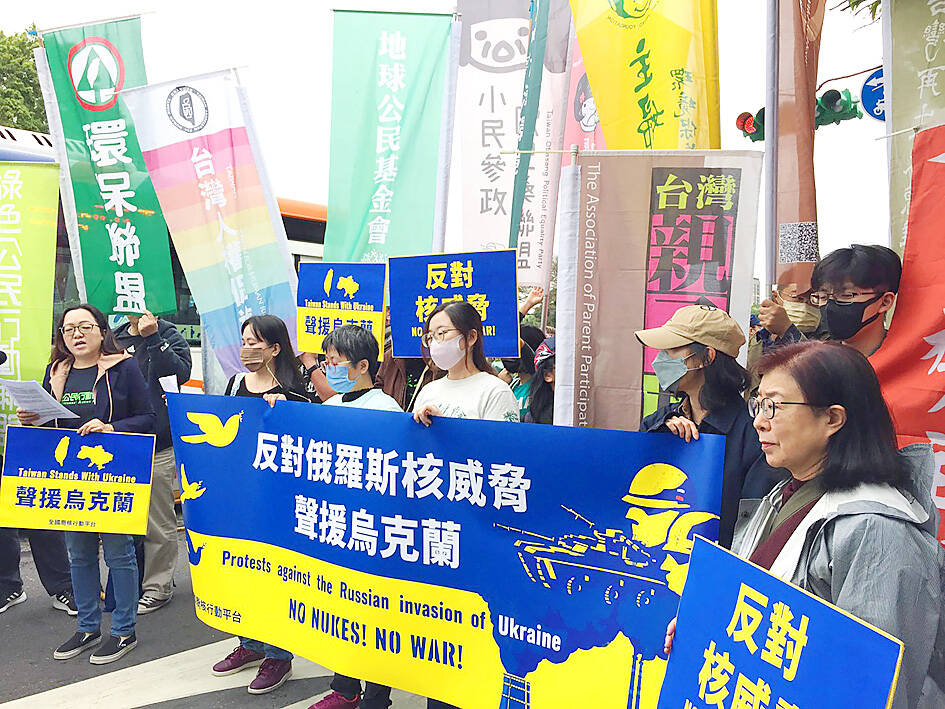A coalition of anti-nuclear groups yesterday demonstrated to raise awareness of the threat of nuclear contamination during war, as the world prepares to mark one year since Russia invaded Ukraine.
Banner-wielding members of the National Nuclear Abolition Action Platform gathered on Ketagalan Boulevard in Taipei, chanting slogans in support of Ukraine ahead of today’s anniversary.
The Zaporizhzhia Nuclear Power Plant in Ukraine has been targeted by shelling as Russian troops attempt to occupy it, posing a threat to global safety, the groups said.

Photo: CNA
People used to think that nuclear power plants would be spared during military conflict, but war does not follow reason, Green Citizens’ Action Alliance secretary-general Tsuei Su-hsin (崔愫欣) said.
Although the Geneva Convention stipulates that nuclear power plants must not be attacked, it is ultimately just words on paper and cannot protect against shelling, Environmental Jurists Association deputy secretary-general Hsieh Pei-yi (謝蓓宜) said.
Countries, including Taiwan, must consider whether their nuclear plants would become a primary target during conflict, she said.
Although a fail-safe was added to the Ma-anshan Nuclear Power Plant to shut off power in the event of an attack, it has not yet been tested, Hsieh said, encouraging urgent attention to the risk of wartime nuclear disaster.
Russian troops have allegedly used phosphorus munitions in Ukraine, generating massive fires and dense smoke, Homemakers United Foundation director Wu Hsin-ping (吳心萍) said, adding that an estimated 20 percent of nature reserves in Ukraine have been destroyed.
Warfare accounts for about 5 percent of all carbon emissions, compared with only 2.9 percent for global shipping, posing an even greater climate risk, she said.
The war has also cast into relief the danger of energy dependence on other nations, Mom Loves Taiwan secretary-general Yang Shun-mei (楊順美) said.
In response to the war, the EU has invested more heavily in renewable energy sources over natural gas to break Russia’s energy oligopoly, she said.
“Conservation and development of renewable energy is a matter of national security,” she added.
However, nuclear power is not a good resistance strategy, Wild at Heart Legal Defense Association attorney Tsai Ya-ying (蔡雅瀅) said.
A decentralized energy grid based on renewables is much harder to disrupt, Tsai said.
Russia has been targeting civilian infrastructure, leaving Ukrainians with unstable power and water supplies during winter, Taiwan Association for Human Rights secretary-general Shih Yi-hsiang (施逸翔) said.
The international community must seek an end to the war and hold Russia accountable, Shih said, adding that Taiwan cannot stay on the sidelines.

Civil society groups yesterday protested outside the Legislative Yuan, decrying Chinese Nationalist Party (KMT) efforts to pass three major bills that they said would seriously harm Taiwan’s democracy, and called to oust KMT caucus whip Fu Kun-chi (傅?萁). It was the second night of the three-day “Bluebird wintertime action” protests in Taipei, with organizers announcing that 8,000 people attended. Organized by Taiwan Citizen Front, the Economic Democracy Union (EDU) and a coalition of civil groups, about 6,000 people began a demonstration in front of KMT party headquarters in Taipei on Wednesday, organizers said. For the third day, the organizers asked people to assemble

POOR IMPLEMENTATION: Teachers welcomed the suspension, saying that the scheme disrupted school schedules, quality of learning and the milk market A policy to offer free milk to all school-age children nationwide is to be suspended next year due to multiple problems arising from implementation of the policy, the Executive Yuan announced yesterday. The policy was designed to increase the calcium intake of school-age children in Taiwan by drinking milk, as more than 80 percent drink less than 240ml per day. The recommended amount is 480ml. It was also implemented to help Taiwanese dairy farmers counter competition from fresh milk produced in New Zealand, which is to be imported to Taiwan tariff-free next year when the Agreement Between New Zealand and

A woman who allegedly spiked the food and drinks of an Australian man with rat poison, leaving him in intensive care, has been charged with attempted murder, the Taipei District Prosecutors’ Office said yesterday. The woman, identified by her surname Yang (楊), is accused of repeatedly poisoning Alex Shorey over the course of several months last year to prevent the Australian man from leaving Taiwan, prosecutors said in a statement. Shorey was evacuated back to Australia on May 3 last year after being admitted to intensive care in Taiwan. According to prosecutors, Yang put bromadiolone, a rodenticide that prevents blood from

China is likely to focus on its economy over the next four years and not set a timetable for attempting to annex Taiwan, a researcher at Beijing’s Tsinghua University wrote in an article published in Foreign Affairs magazine on Friday. In the article titled “Why China isn’t scared of Trump: US-Chinese tensions may rise, but his isolationism will help Beijing,” Chinese international studies researcher Yan Xuetong (閻學通) wrote that the US and China are unlikely to go to war over Taiwan in the next four years under US president-elect Donald Trump. While economic and military tensions between the US and China would